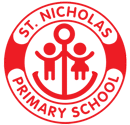Computing at St Nicholas
Technology has become a significant role in society today. At St Nicholas Primary School, the children are taught different units to help them understand different aspects of computing. For example, Coding, Database and Spreadsheets and Internet Safety. The children have access to different kinds of technology, using Chrome Books and iPads.
We offer a curriculum that enables children to become effective users of technology and teach them to:
- Understand and apply the fundamental principles and concepts of computer science, including abstraction, logic, algorithms and data representation.
- Analyse problems in computational terms, and have repeated practical experience or writing computer programs in order to solve such problems.
- Evaluate and apply information technology, including new or unfamiliar technologies, analytically to solve problems.
- Are responsible, competent, confident and creative users of information and communication technology.
Computing has deep links with mathematics, science and design and technology, and provides insights into both natural and artificial systems. Computing also ensures that pupils become digitally literate – able to use, and express themselves and develop their ideas through, information and communication technology – at a level suitable for the future workplace and as active participants in a digital world.
Key Stage 1
In years 1 and 2, pupils are taught to understand what algorithms are; how they are implemented as programs on digital devices; and that programs execute by following precise and unambiguous instructions. They are also taught to be able to debug simple programs and use logical reasoning to predict the behaviour of simple programs. Children will also use technology purposefully to create, organise, store, manipulate and retrieve digital content and recognise common uses of information technology beyond school. E-Safety is a vital topic in computing throughout the whole school. Children will use technology safely and respectfully, keeping personal information private; identify where to go for help and support when they have concerns about content or contact on the internet or other online technologies.
Key Stage 2
In years 3 to 6, the Computing curriculum builds and expands on prior knowledge and understanding. Pupils are taught to design, write and debug programs that accomplish specific goals, including controlling or simulating physical systems and solve problems by decomposing them into smaller parts. Children will use sequence, selections, and repetition in programs, work with variables and various forms of input and output and will use logical reasoning to explain how some simple algorithms work, along with how to detect and correct errors in algorithms and programs. They will understand computer networks including the internet; how they can provide multiple services, such as the world wide web; and the opportunities they offer for communication and collaboration. It is important that children are able to select, use and combine a variety of software (including internet services) on a range of digital devices to design and create a range of programs, systems and content that accomplish given goals, including collecting, analysing, evaluating and presenting data and information. E-Safety is a vital topic in computing throughout the whole school. Children will use technology safely, respectfully and responsibly and will recognise acceptable/unacceptable behaviour and identify a range of ways to report concerns about content and contact.
E-safety
Online safety is a vital part of the computing curriculum. The children cover online safety with their computing unit ‘e-safety’ and they also cover this throughout the school year in assemblies and Internet Safety days. Our aim is for all the children to know how to be safe online and who they can speak to if they have any concerns or worries.
How can I support my child with Computing?
It is important that children are supported and monitored while on a device and the internet. Children should know who they can talk to when they see something they are unsure about while on the internet.
Children can access Purple Mash at home, which is the scheme we use in school. If children can access this at home, this will help consolidate the learning that we have been doing in school.
Useful websites
Purple Mash– This is the scheme that we use in school. Children can access this while at home. Homework will sometimes be set on here too.
The BBC Bitesize website has lots of videos and games that the children can play to develop their understanding of Computing. Follow the link below and select the appropriate Key Stage for your child.
Parentzone – a hub of advice for families about the internet and digital devices.
What children should know about being online
